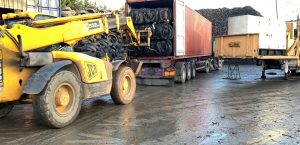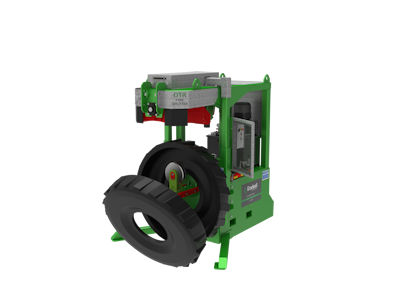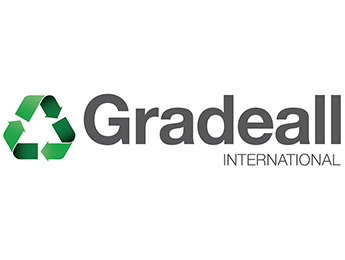Gradeall speaks of the impact of tariffs on its trade with the USA and the threat to employment in the UK
“When tariff uncertainty makes customers hesitant to invest, it affects not just our business, but the broader goal of improving waste management infrastructure across America,” states Conor Murphy, director at Gradeall International Ltd
Northern Ireland based Gradeall is a globally recognised leader in tyre processing equipment, its baling presses are renowned as the best in the market.
Over the past six years, Gradeall has established strong US relationships and a significant customer base, making this market essential to its revenue. However, unpredictable US trade policies now threaten the stability and growth of exporters like Gradeall and the broader manufacturing sector. The main problem is not just tariff rates, but the damaging uncertainty surrounding them.
Tyre and Rubber Recycling‘s sister publication, Commercial Tyre Business has written about the impact of tariffs and reflected oon the impact on US-China trade, however, the effect of higher prices in the USA has hit closer to home, as Gradeall’s Conor Murphy explains.

The vacillation of the US government’s approach to tariffs has left both exporters and importers in a state of flux, I the case of Gradeall, the company has seen US customers delaying of postponing purchases in the hope of changes on tariffs in the future.
Uncertainty is a direct impact on trade and investment. No-one wants to invest in a market that faces negative actions.
According to a recent survey, 61% of manufacturing businesses expect turnover to decrease as a result of ongoing US tariffs, with 55% anticipating lower profits by the end of the year

A particularly frustrating issue for Gradeall and its customers has been the inconsistent application of tariffs at different US ports. There have been documented cases where identical shipments of Gradeall machinery have attracted vastly different tariff rates – ranging from 10% to as high as 46% – depending on the port of entry, such as Savannah, Georgia versus Norfolk, Virginia. These discrepancies often arise from administrative errors or misinterpretation of customs documentation, but the end result is the same: confusion, extra costs, and a loss of confidence in the purchasing process.
This lack of clarity extends to the customs process itself. US customers are often left unsure of the exact amount they will be required to pay until their goods arrive at port, making it difficult to budget and plan for new equipment purchases. The administrative burden on both customers and suppliers is significant, with additional paperwork and communication required to resolve tariff disputes and navigate the customs maze.
Beyond the tariffs themselves, delays in customs processing can lead to substantial demurrage fees – charges incurred when containers are held at port beyond the agreed free period. Companies have experienced situations where customers faced significant demurrage costs simply because US customs were unable to process tariff payments quickly enough to release containers. In one instance, the company could not even pay the tariff because the designated bank account was not yet operational, compounding the delay and cost.
Demurrage and detention charges at US ports are among the highest in the world. Reports show that average demurrage fees can range from $50 to $250 per container per day, depending on the port and container size. These costs quickly add up, placing additional financial strain on customers and making Gradeall’s products less competitive in the US market.
The cumulative effect of these issues is a deterioration in the customer experience. For US buyers, the process of importing machinery from Northern Ireland has become fraught with uncertainty, extra costs, and administrative headaches.
For Gradeall, this means not only a direct impact on sales and turnover, but also a significant diversion of resources towards helping customers navigate the new trade environment. Smaller manufacturers, in particular, struggle to absorb these additional costs and administrative burdens, putting them at a competitive disadvantage compared to larger firms.
The challenges faced by b are emblematic of the wider difficulties confronting manufacturing exporters across the UK and Northern Ireland. Recent analysis by the Department for the Economy suggests that a 10% US tariff on UK goods could cost the Northern Ireland economy £85 million and lead to the loss of 800 jobs over the next 15 years. The machinery sector, in which Gradeall operates, is identified as particularly vulnerable to these trade barriers.
Moreover, the uncertainty created by the tariff regime is prompting many businesses to review their profit margins, scale back production, and reconsider investment plans. Nearly half (49%) of surveyed manufacturing firms are exploring entry into new markets or regions to reduce their dependence on US-linked trade. This shift not only threatens the growth prospects of individual companies, but also has potential knock-on effects for regional employment and economic output.
Despite these formidable challenges, Gradeall International Ltd continues to lead by example. With a reputation for innovation, durability, and customer service, Gradeall’s range of waste compaction and recycling equipment remains in high demand around the world. The company’s commitment to supporting its US customers – helping them navigate complex customs procedures, providing transparent pricing, and offering remote monitoring solutions – sets it apart as a market and industry leader.
Gradeall’s experience highlights the resilience and adaptability of Northern Ireland’s manufacturing sector. By maintaining close relationships with customers, investing in product development, and advocating for fairer trade practices, Gradeall is not only weathering the current storm but laying the groundwork for future growth.
The ongoing uncertainty and complexity of US tariffs are inflicting real and measurable harm on manufacturing businesses in Northern Ireland and beyond. From inconsistent tariff rates and mounting demurrage fees to delayed purchasing decisions and lost sales, the costs are both immediate and long-term. For Gradeall International Ltd, these challenges underscore the importance of clear, stable trade policies and the vital role of exporters in sustaining economic growth.
As policymakers on both sides of the Atlantic work towards a more predictable and equitable trading environment, Gradeall stands ready to continue serving its customers with the same commitment to quality and innovation that has made it a global leader in recycling machinery.
Despite facing significant trade barriers, Gradeall International Ltd continues to manufacture world-class recycling and waste management equipment that serves customers across five continents. The company’s comprehensive product portfolio demonstrates the innovation and engineering excellence that Northern Ireland brings to global markets.
Gradeall’s flagship products include the MK2 and MK3 Tyre Balers, which can process up to 6 PAS108-compliant bales per hour, reducing tyre volume by 80%. These machines have become essential equipment for recycling facilities across America, where approximately 280 million tyres reach end-of-life status annually.
The company’s Truck Tyre Sidewall Cutter represents cutting-edge technology for processing large commercial tyres, whilst the OTR (Off-The-Road) Tyre Splitter tackles the massive tyres used in mining and construction industries. These specialised machines address critical waste management challenges in sectors vital to the US economy.
“Our OTR equipment processes tyres that can weigh up to 600kg each,” explains Conor Murphy. “When mining companies in states like Nevada and Wyoming face delays and uncertainty over tariffs, it affects their ability to manage waste responsibly and plan for equipment replacement.”


















